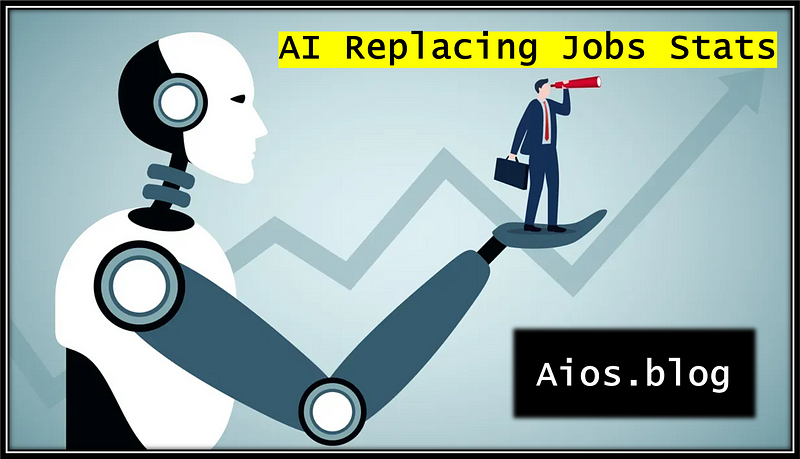AI is getting smarter, and some worry it will take all the jobs.
But is that really true?
This article dives into the latest stats (from 2024!) to see how AI is changing the job market, replacing some jobs and creating new ones.
AI is transforming the job market, and here’s the latest on what to expect:
- Job losses are coming, but not for everyone. Up to 14% of workers globally (375 million!) could be impacted by 2030, with some jobs like data entry being hit especially hard (7.5 million jobs lost by 2027).
- Manufacturing is at risk too. By 2025, robots and automation could replace 2 million manufacturing jobs.
- AI creates new jobs too! While some jobs disappear, new ones will be created by AI. CEOs are getting ready for this shift, with 75% expecting AI to change their businesses within 3 years.
- Almost everyone will be affected. Even office jobs aren’t safe – research suggests 80% of US workers will have some tasks automated by AI.
- The pace of change is uncertain. Experts predict significant job losses, but some CEOs aren’t worried about widespread layoffs in 2024.
- It won’t happen overnight. Fully automating half of all jobs could take 20 years due to various challenges.
So what percentage of jobs will AI take?
Estimates range from 14% to 30% by 2030, but some experts believe it could take much longer to automate even half of all jobs.
Here’s a concise summary for you:
| Jobs Statistic | Estimate |
|---|---|
| Jobs will impacted by AI by 2030 | 14% |
| Jobs likely to be automated by 2030 | 30% |
| Total jobs potentially replaced worldwide | 300 million |
AI is reshaping the job market in the world, but it’s a complex picture.
While some jobs will disappear, new ones will emerge.

10+ Stats On AI Jobs in 2024 at AIOS Blog
1) Experts say AI could replace up to 300 million jobs worldwide (Goldman Sachs via BBC)
While 9.1% of jobs globally might be at risk of automation by AI, it won’t hit every job equally.
Think creative fields like writing, photography, and even software development — these are more likely to see AI take over some tasks.
2) By 2025, 2 million workers could be replaced by AI tools (MIT / Boston University)
A study by MIT and Boston University predicts that by 2025, robots and other automated tools could replace up to 2 million manufacturing jobs.
While AI itself might not directly cause all the job losses, some of these lost positions could be filled by new AI-powered tools in the factories.
3) By 2030, 14% of the workforce will be impacted (McKinsey)
Estimates say that by 2030, around 14% of the global workforce, or 375 million workers, could be impacted by AI and need to switch careers.
4) CEOs expect gen AI to lead to job cuts(PwC)
A survey of CEOs by PwC [PricewaterhouseCoopers, a major consulting firm] found that most CEOs didn’t expect widespread job losses from generative AI.
However, even a small number of companies cutting jobs could affect many workers worldwide.
5) CEOs are getting ready for a big change! (PwC)
A PwC survey found that 75% expect generative AI to shake things up in their businesses within just 3 years.
This means retraining workers, improving security, and a bunch of other adjustments to adapt to this new AI technology.
6) Even office jobs aren’t safe! (ARXIV)
Even office jobs aren’t safe! Research suggests that 80% of workers in the US will have at least 10% of their tasks automated by AI tools like large language models.
This means AI is likely to affect almost everyone’s work in some way.
7) Around 7.5 million data entry jobs will be lost by 2027 (WEF)
Data entry is expected to be the most impacted profession by AI, with an estimated loss of 7.5 million jobs by 2027.
This highlights the vulnerability of repetitive, rule-based tasks to automation.
8) Job Layoffs in 2024 because of AI (Resume Builder)
It seems that while a significant portion of companies (44%) anticipate AI to cause layoffs in 2024, only 21% are certain about it.
This suggests that there’s some uncertainty surrounding the immediate impact of AI on employment. The other 23% were less certain about this change.
9) Around 47% of US worker’s job is at risk (CEPR)
Close to half (47%) of US workers are estimated to be at risk of job losses due to automation in the next decade.
This includes automation from both AI and non-AI tools like robots.
This highlights the significant impact that automation is likely to have on the job market in the coming years.
10) McKinsey predictions for worldwide work tasks (McKinsey)
Even though automating half of all jobs globally could bring big economic benefits, it’s a slow burn.
McKinsey predicts it will take at least 20 years because of various challenges.
These challenges could be legal restrictions, political resistance, high costs, or even social concerns — and they won’t be easy to solve.
11) Even creative fields aren’t safe
81.6% of digital marketers believe AI will lead to job losses for content writers.
Content creation is one area where AI has already made significant strides.
We covered more stats on AI writing in our post on the Aios blog.
12) New jobs are coming (WEF)
According to the World Economic Forum’s Future of Jobs Report, AI will create 97 million new opportunities for employment by 2025.
Learn how we can collaborate with AI-powered technologies to grow our blog at Aios.blog!
Conclusion
So what’s the bottom line?
AI is changing the job market, but it’s a complex picture.
Some jobs will be lost, but new ones will be created.
The key is to be prepared by developing new skills to stay ahead of the curve.

Leave a Reply